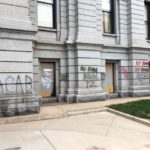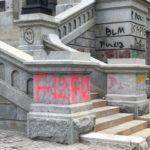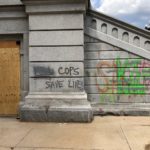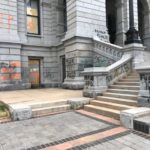DENVER — Although it’s been a month since large-scale destruction and vandalism began at the State Capitol area in connection with protests around the George Floyd killing, the state has yet to begin cleanup of the Capitol, which remains heavily covered in graffiti, with windows boarded up, leading many to wonder what the issue is and worry that complacency will harm Denver’s livability.

“The sight isn’t just demoralizing to law-abiding taxpayers; the lingering damage communicates a message to criminals: vandalism and violence are tolerated in the city. Feel free to do it again.” wrote Krista Kafer in recent column published in the Denver Post. Kafer, a Colorado native and education consultant, added: “Moreover, the increase in crime along with threats to defund the police will make people think twice about living or doing business in the city. If it continues long enough, Denverites will head to perceived safer ground — the suburbs.”
Kafer is not alone in her assessment, many of Colorado’s state Legislators have questioned on their social media pages the time it’s taking to clean up one of the most visited and focal destinations of downtown Denver, and the seat of state government.
Some also say it’s not just about cleanup but future prevention.
House District 51 Rep. Hugh McKean, R-Loveland said clean-up work is about to begin, confirming the delay has been a matter of insurance settlements. He said the bigger problem; however, is that the state has struggled with how to keep the area around the Capitol clean for years.

McKean said the state has filed several claims prior to COVID-19 and the George Floyd riots because of damage caused to the building and grounds from homeless who defecate alongside the building, among other types of vandalism.
Windows to some of the committee rooms could not be opened because of the smell, and urine would run down the ramp behind the electronics room.
“The problem isn’t just cleaning up the impromptu bathrooms,” McKean said. “It is how do you stop the behavior in the first place?”
McKean said now is the time to discuss a more secure area around the Capitol that could include fencing off the area around the Capitol so it can be secured at night once the building has closed for the day.
“As we finish up the renovations and have to redo the grounds and the circle and all of that, what is the thought … so that we don’t have this continual cycle of damage.”

McKean said he worries the premium on the state’s insurance will skyrocket or there will be riders to what is paid and what is not in the future, costs that will fall on the backs of taxpayers.
“We just need to control the access,” McKean said, adding the level of security by the Colorado State Patrol has decreased at night under Gov. Jared Polis.
That is a result of where a governor chooses to live. Former Gov. John Hickenlooper chose to live in either the Governor’s Mansion or nearby his office at the Capitol. State Troopers could patrol the area at night in that case.
“Now you don’t just have the state patrol down the street,” McKean said, referencing their duties to protect the governor. “Now the State Patrol is in Boulder every night.”

Kafer said in her editorial that she fears the destruction will only get worse if something is not done.
“People need to feel safe to survive,” Kafer said. “That sense of safety and security is now at risk. Just as order begets order, disorder begets disorder. … While everyone has the right to peacefully protest injustice, vandalism cannot be tolerated. The vandalism cost taxpayers and business owners more than $5.5 million. As long as the destruction remains visible, criminals will continue to target other people’s property. If allowed to continue, it’s only a matter of time before law abiding people pack up and leave and the unfortunate cycle of urban decay begins again.”


